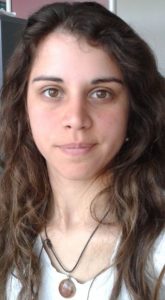Krug, Cecilia Pamela

Postdoctoral Fellow CONICET.
Associate Professor - Universidad de Favaloro.
https://orcid.org/0000-0002-7711-4490
https://www.linkedin.com/in/cecilia-pamela-krug-496aa950
Professional resume + Expertise
Cecilia Pamela Krug received a degree in Biological Sciences from the University of Buenos Aires in 2012 and a doctorate in Biological Sciences at the same university in 2018. She worked in two main themes throughout her career: Biological control of weeds and Ecological Integrity in wetland environments of the Lower Paraná River Delta, with special emphasis on plant communities, anurans, and the study of physical and chemical parameters of water and soil. She worked closely with livestock (cow and buffalo) and forestry producers in the Lower Delta region. She has a broad vision of environmental problems, especially in wetland environments and, in particular, to understand how biological invasions of exotic weeds affect the ecosystem goods and services that these systems provide. She also has extensive knowledge of statistics that allow her the correct modeling of the data obtained. She participated in multiple national and international scientific meetings. She published a dozen papers in national and international scientific journals and minutes of scientific meetings. She currently has a postdoctoral fellowship. Her work topic is the livestock (cattle and buffalo) in wetlands and their implications on the anuran communities at different scales. This work is framed within the project "Blue Corridor: connecting people, nature, and economies along with the Paraná-Paraguay river system" the dimension of livestock production. She is an adjunct professor at the University of Favaloro in Advanced Biometrics.
Keywords
Amphibians, Wetlands, Delta Del Río Paraná, Weeds, Biological Control.
Research
Cattle and buffalo in wetlands: implications at different scales on anuran communities.
The objective of the work is to evaluate the sustainability at multiple spatial scales of the different livestock modalities that are currently carried out in the Lower Non-insular Delta of the Paraná River (cattle and buffalo with and without water management), analyzing their impact on the anuran communities. The ultimate purpose of this study is to generate information that can be transferred to the productive sector in the form of management recommendations to advance environmentally sustainable livestock in the region.
Most important publications
https://doi.org/10.4404/hystrix-00232-2019
https://doi.org/10.1007/s10526-019-09959-9